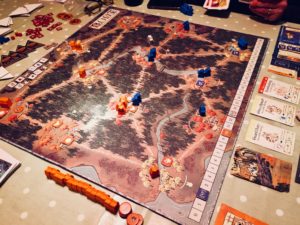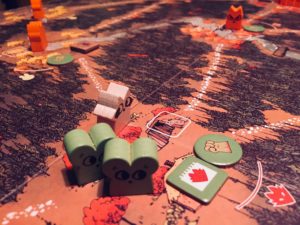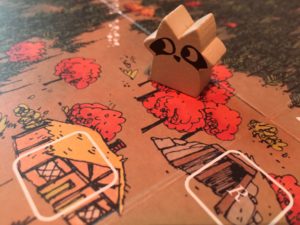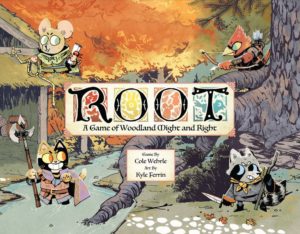
Root it Out!
February 12, 2019 by Sam
Root came out in 2018 and swiftly became one of my favourite games. Because it’s very different to a lot of games out there, it’s worth exploring a little beyond what we’ve put in the games page.
Every game of Root is a story, where each player represents a faction in a forest that’s swirling with militarised upheaval.

Let’s assume we’re playing all four factions (the game does play less, or more if you have the expansion): the newly-anointed Queen of the Forest, Marquis de Cat, is about to have its hold on power tested by the resurgent Eyrie. Trampled underfoot in this war are the increasingly restless natives – the forest dwellers sick of the power struggles above them form the Woodland Alliance. And finally there is the rapscallion semi-outlaw in the form of the Vagabond: unlike the others, this ‘faction’ is a single person, travelling freely amidst the three-way war as a kind of merchant-cum-assassin: at any time they can go rogue, and start picking off the other factions’ warriors to score points, but in doing so they make themselves more of a target.
At the start of the game everyone’s goal is the same – be the first to score 30 points. But how each player goes about achieving it is markedly different. The Marquis needs to keep building, because they score points by doing so. Building sawmills get them more wood (needed for building!) recruiters to get more cats on the board (needed to defend/attack) and workshops to craft items – more on crafting in a bit.
The Eyrie also score points by building, albeit they only have a single type: roosts don’t need wood to be built and serve as a kind of recruiter-and-workshop in one. But whereas the Marquis operate in a manner similar to many other games – gather/produce resources in order to spend them – the Eyrie’s militaristic and traditionalist society demands that they follow a decree: an order of cards that must be added to on every turn and then successfully followed: recruit, move, battle, build, in that order! If the decree breaks down, so (temporarily) does the Eyrie, costing points before everything resets and a new decree begins to build.
The Woodland Alliance begin the game not even on present the board – at least, they have no pieces present. How they explode into life is partly what makes Root such a fascinating game; early on, the Alliance simply builds sympathy for their cause: spending cards to place tokens out on the board. This represents the growing ill-will toward the Marquis and Eyrie, who are waging war around the little folk in a struggle for power they clearly don’t intend to share. When sympathy is present in a clearing, it costs rival factions a card – a precious commodity, as we shall see – to move into the clearing, and another card if they want to quash the resentment there (ie remove the sympathy token). At some point in the game, any one of these sympathy tokens may turn into a revolt; suddenly all rivals in the clearing are obliterated and the Alliance go from grumbling plebs to combative, lethal guerrillas.

Finally the Vagabond is not so much a faction as a shifty, point-grabbing opportunist: he’ll buy crafted items (cutely, these are things like teapots and lamps as well as swords and crossbows) from other factions and give them cards in return. Then he uses the crafted items to take actions on his turn, the key one probably being completing a Quest, which demand certain crafted items to be in the Vagabond’s possession. Each crafted item can only be used once on each turn though, so it’s a more tactical role than it might first appear – particularly as the Vagabond can score points by aligning himself with other factions (simply by buying from them) or conversely turn against them by picking off their warriors on the board: he’ll score points whenever he does so, but being persona non grata makes it much harder for him to get around.

The game-winning objective can change: rather than hitting the 30-point mark, each faction can switch strategies. The Marquis, Eyrie and Alliance can play a Dominance card that changes their victory condition to something else: control of certain clearings in the forest at the start of any turn. But this can be hugely risky, as all other factions get at least one turn with which to harpoon this gambit, and having played a Dominance card, you can’t abandon it. The Vagabond, meanwhile, can team up with a faction in order to share their (potential) victory – this is assuming they haven’t been killing them already. But this too comes with a hefty caveat: the Vagabond isn’t necessarily seen as a desirable partner in the forest, and can only team up with the player currently in last place on the points track!
The whole thing amounts to a very feisty affair, where searing off into an early lead could be a huge mistake, as – as with many multi-player war-games – others will naturally make alliances (tacit or otherwise!) in order to peg you back. And it’s worth remembering that Root really is a war-game: the delightful and child-friendly artwork is somewhat incongruous in that regard, because this is not one to be cheerily playing with younger kids – it’s extremely combative, it’s harsh and unforgiving, it’s tough to learn because even though each faction plays relatively simply, you kind of need to know how all of them work to have the best understanding and experience of the game. It’s even got dice-rolling for a (simple) combat system that will have lovers of control gnashing their teeth in frustration. But it’s also brilliant for the right group of gamers – those who love the cannily-designed asymmetry, who don’t mind the very high Take-That quotient and basically, those who love an epic punch-up in clothkit clothing: an iron fist in a cute mitten.


Sam likes games. He buys a lot of games, plays a lot of games, and likes talking about games too. Occasionally he dreams about games. Despite this, he is a happily married individual with reasonably well-adjusted children, who roll their eyes at him on a pretty frequent basis.
But they still play the odd game, so it's ok.
Sam's favourite games are a constantly shifting thing that he'd find hard to define, although he's not mad keen on orcs, miniatures, or heavy sets of rules with endless exceptions and special circumstances. He plays the occasional solo game, but feels a big part of board-gaming's appeal is the gathering of friends around a table, interacting with a tangible, physical thing.
